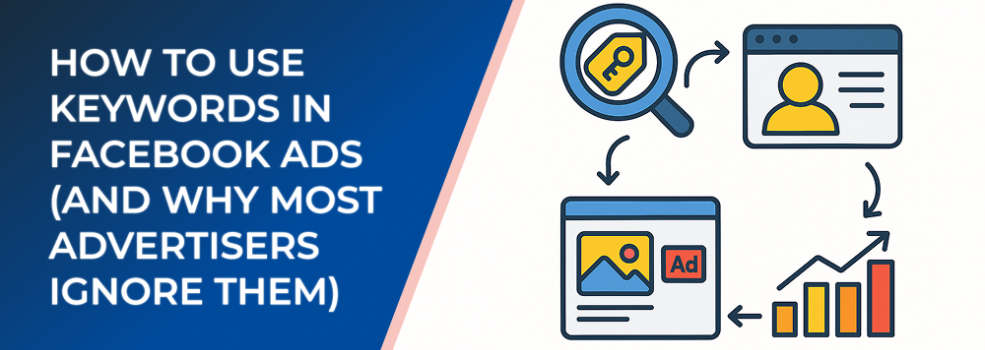How to Use Keywords in Facebook Ads (And Why Most Advertisers Ignore Them)
Short Announcement
Most advertisers underestimate how powerful keywords can be in Facebook Ads. This article explains how to use keyword strategies to improve ad targeting, boost relevance, and lower your costs—even on a platform that doesn’t rely on traditional keyword targeting.
Why Keywords Still Matter on Facebook
While Facebook doesn’t use keywords in the same way as Google Ads, they remain a critical part of your audience and creative strategy. Keywords help shape who sees your ad, how it resonates, and how Facebook’s algorithm understands your offer.
Research shows that ad relevance scores can improve by up to 25% when copy, visuals, and targeting are aligned with strong keyword intent. That means better engagement, lower CPMs, and higher conversion rates.
1. Using Keywords in Audience Targeting
Facebook lets advertisers target audiences based on interests, behaviors, and demographics—but those interests are often linked to keyword data. For example:
-
A keyword like "email marketing" might connect to interests such as Mailchimp, HubSpot, or marketing automation tools.
-
A keyword like "fitness" could match interests such as workout apps, gym memberships, or fitness influencers.

Visualization of how keywords guide targeting, creative, and conversion flow in Facebook Ads
When building audiences, type in broad keywords related to your niche to discover hidden interests that Facebook associates with those topics. This approach can uncover thousands of potential targeting combinations.
Brands that use this strategy often see up to 20% lower CPMs compared to relying on demographics alone.
2. Keywords in Ad Copy and Creative
Your audience targeting only gets you so far—you also need your ads to speak the language of your potential buyers. Incorporating keywords into your:
-
Headlines (e.g., "Best Email Marketing Tools for Small Businesses")
-
Descriptions (e.g., "Simplify your lead generation and automate email follow-ups.")
-
Visuals (using text overlays that reinforce intent)
When your ad copy matches the user’s search intent or interest signals, Facebook interprets it as more relevant. That can directly improve engagement metrics. In fact, ads with keyword-optimized headlines generate up to 30% higher click-through rates (CTR).
3. Keyword-Based Custom Audiences
Another way to apply keyword thinking is when creating Custom Audiences. For instance:
-
Upload an email list segmented by the type of products or services users showed interest in.
-
Use pixel data from pages optimized for specific keywords (like blog posts or landing pages).
You can then create Lookalike Audiences based on those segmented keyword-driven groups—allowing Facebook’s AI to find more users with similar interests.
This approach often boosts conversion rates by 15–20% since the algorithm is fed more contextually relevant signals.
4. Retargeting with Keyword Segmentation
If you publish content around specific topics, retargeting based on keyword intent can drive warm, high-converting traffic back to your site. Example:
-
People who viewed blog posts about "social media automation" can see ads for a product that solves exactly that problem.
By mapping retargeting flows around keyword clusters, advertisers can personalize their message based on what users previously interacted with.
Data shows that keyword-driven retargeting ads achieve up to 2x higher ROI compared to generic retargeting.
5. Testing and Optimization
Testing is where keyword usage truly pays off. Start with small variations:
-
Different sets of interest keywords
-
Variations of ad headlines using the same keyword
-
Audience segments built from multiple related keywords

Performance uplift seen when ads and targeting align with keyword strategy
Measure how these impact metrics like CTR, CPA, and ROAS. Over time, you’ll identify which keyword clusters yield the most efficient results.
A/B testing keyword relevance in both ad copy and targeting can cut your cost per click (CPC) by 10–20% while maintaining quality traffic.
Why Most Advertisers Ignore Keywords
Many advertisers assume Facebook doesn’t need keyword strategy because it’s not a search engine. That’s a mistake. Keywords reveal intent and mindset—two things the Facebook algorithm values highly when predicting ad engagement.
Ignoring them often means broader, less-relevant audiences and weaker performance. Smart advertisers treat keywords as an invisible layer guiding both content and targeting decisions.
Related Articles from LeadEnforce
-
How to Define a Target Audience for Marketing: A Step-by-Step Guide
-
How to Analyze Campaign Data to Identify Growth Opportunities
Final Thoughts
Keywords are more than SEO tools—they’re signals of intent that can dramatically enhance your Facebook ad campaigns. By integrating keyword strategies into audience building, copywriting, and retargeting, advertisers can improve efficiency and relevance without relying solely on algorithms. Those who leverage keyword intelligence will consistently outperform competitors who ignore it.

